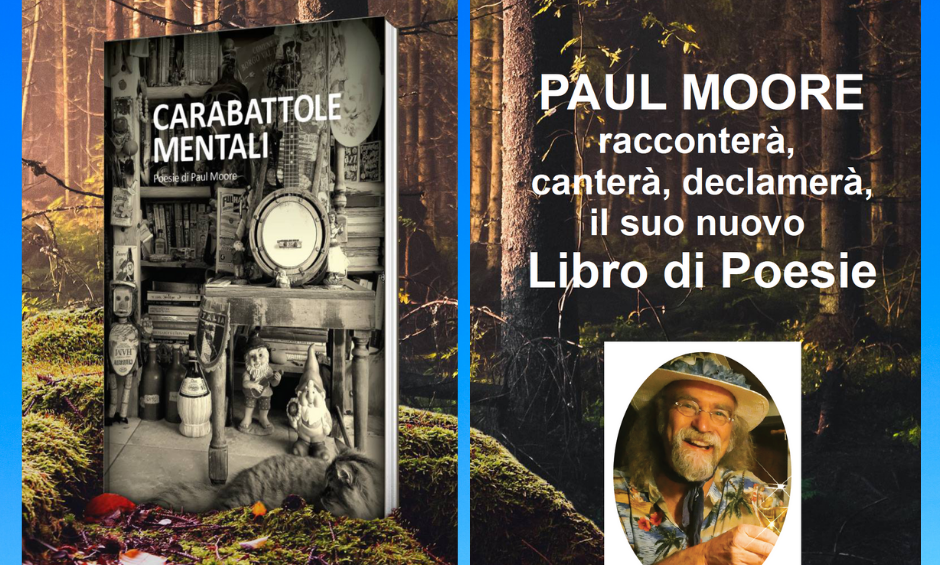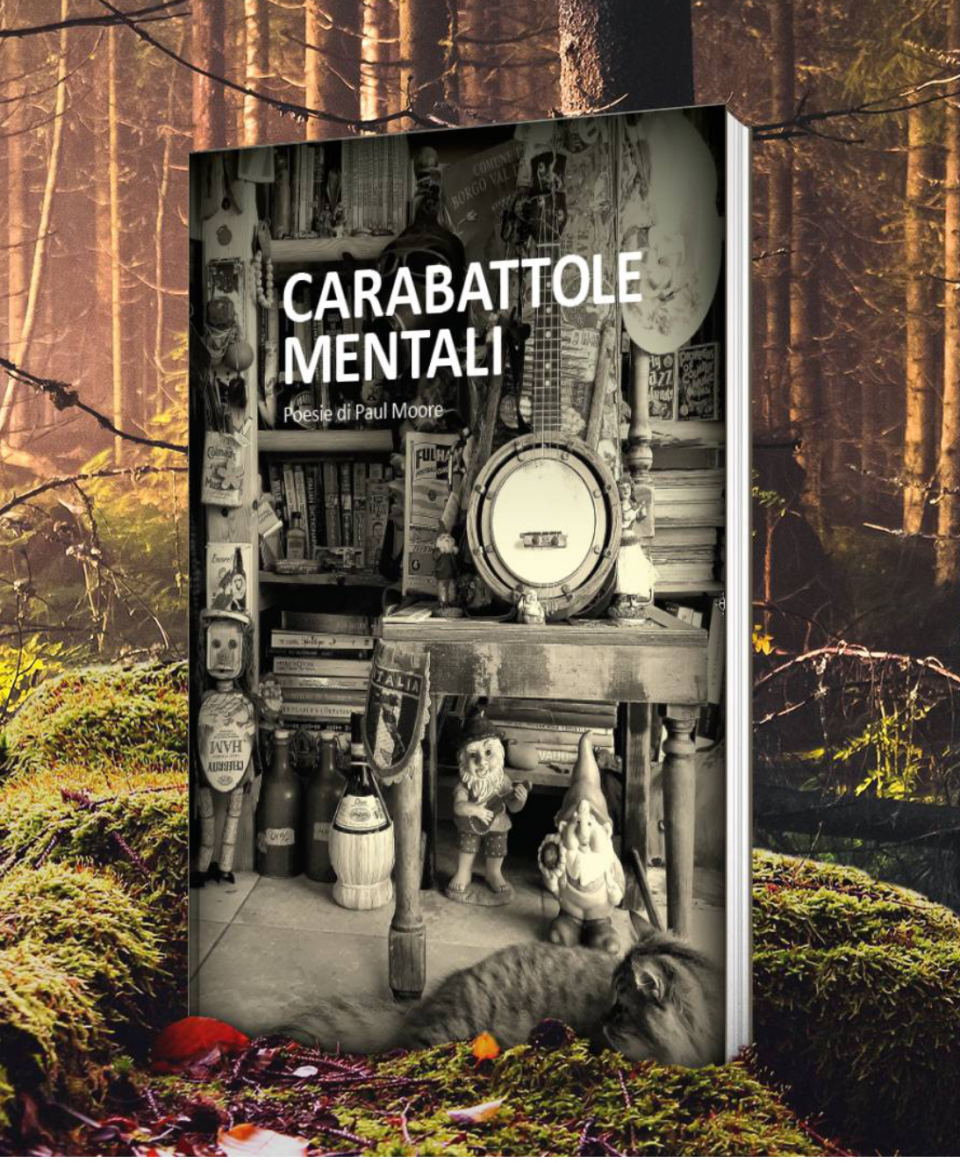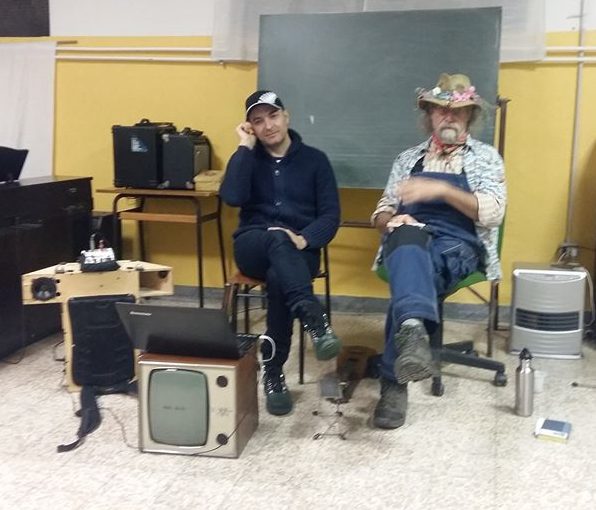
PAUL’S MIND JUNK
Review by Davide Donelli
It had been a long time since I last made pencil notes directly on the pages of a book. Anyway, I think that was the first time I made notes on a book of poetry. I needed to stop the stream of thoughts that quickly flowed as I was reading Paul Moore’s poems, published in the collection entitled Mind Junk. Taking this kind of notes a few months ago has turned out to be useful to review a book that leads the reader into a real and imaginative world, filtered by a particular sensitivity reading the events and phenomena of the world through an unusual magnifying glass.
Nevertheless, I had already heard some of those poems recited by Paul himself in English, or by Lorenzo Vignando in Italian, on the occasion of the presentation of the book in Cologno Monzese during their Italian tour last winter. In that context, music sounded like a background for the poetry expressed in the form of mind junk: “what remains in our brain over the years. Random thoughts we have collected, or once found useful, are there somewhere waiting”.
 I guess Paul Moore is quite well known among the ukulele lovers, but reading or listening to this collection of poems would be a significant contribution to the portrait of One Man Band, a hippie style singer accompanying himself with his inseparable banjolele, also using everyday objects and recycled or reused materials. At this moment I am reminded of the image of Paul preparing his setting with percussion and various instruments: he always arranges them with care and precision following a very precise plan before every performance. Each object, like a sewing thimble or a bicycle bell, seems to be unimportant and insignificant at a superficial level, while it actually makes sense and it acquires a special value thanks to its combination with all the others. It is only possible to get a coherent overview from the relationship between all the individual objects.
I guess Paul Moore is quite well known among the ukulele lovers, but reading or listening to this collection of poems would be a significant contribution to the portrait of One Man Band, a hippie style singer accompanying himself with his inseparable banjolele, also using everyday objects and recycled or reused materials. At this moment I am reminded of the image of Paul preparing his setting with percussion and various instruments: he always arranges them with care and precision following a very precise plan before every performance. Each object, like a sewing thimble or a bicycle bell, seems to be unimportant and insignificant at a superficial level, while it actually makes sense and it acquires a special value thanks to its combination with all the others. It is only possible to get a coherent overview from the relationship between all the individual objects.
The parallel between material object and poetic thought seems to be a fundamental aspect that deserves to be underlined, as suggested by the cover of Mind Junk, written in English and translated into Hebrew and even Italian by Lorenzo Vignando. The cover photo, in fact, shows a house interior with a whole series of elements: books, figurines representing hobbits, a football magazine, a banjolele, a bottle of Chianti but also the pennant of Italy to which Paul often makes reference, given his mother’s origins, that is, Tuscan. As confirmation of how close the relationship between the physical and mental world is, I quote these very explicit verses: “In the garden a seed opens/ Inside my head, it has taken root”.
As has been mentioned earlier, the book can be listened to, as well as read, since a series of audio recordings of the poems with acoustic-musical backgrounds is provided in combination with the print version. This aspect conveys different projections: many of the poems turn into short performances that can be placed within a particularly stimulating poetic reading. It seems curious how it still involves reusing an object, but this time it is literary material placed in the context of a performance.
 This too is an ecological attitude, the protection and preservation of things and thoughts, giving meaning to the poetic approach of an artist capable of blending the fairytale and sensitive reality together, the dream and typical Anglo-Saxon pragmatism: Life and Death, Peace and War, Poetry and Music, Nature and Time, each with his cyclic balance, his own family roots and the freedom to be oneself, the courage to change and the work of a musician.
This too is an ecological attitude, the protection and preservation of things and thoughts, giving meaning to the poetic approach of an artist capable of blending the fairytale and sensitive reality together, the dream and typical Anglo-Saxon pragmatism: Life and Death, Peace and War, Poetry and Music, Nature and Time, each with his cyclic balance, his own family roots and the freedom to be oneself, the courage to change and the work of a musician.
As I write in a blog dealing with ukuleles, I want to dedicate my last thoughts to this instrument: thanks to its qualities, which have always guaranteed its widespread popularity, the ukulele fits perfectly in this sensitive and spiritual panorama. Inhabiting this world with fantasy and lightness, it’s fully integrated as part of a whole and it can even have a cathartic power over the most dramatic events of existence, such as war.
“When you play me, you will hear no rattle of machine guns,
Crack of a sniper’s bullet or dull thud of artillery.
War cemeteries are silent,
There is no end to this,
But if you want a ukulele,
Here I am!”
(Translated by Nicole Tagliabue)


